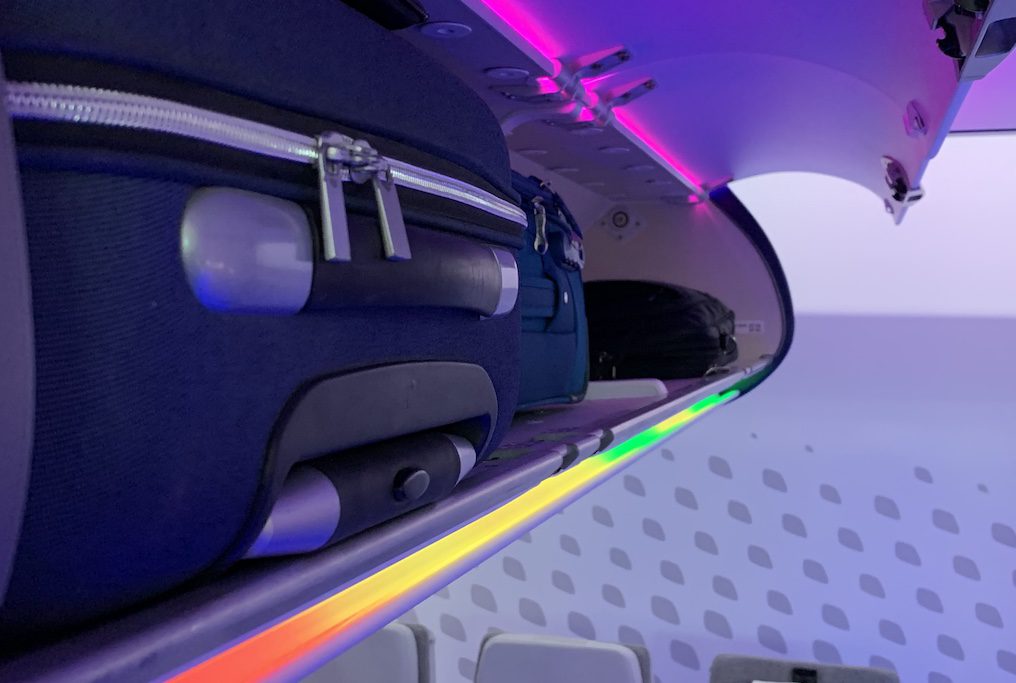Overhead Bins Stir Lots of Flyer Anxiety: Digital Tech Is Here to Help

Skift Take
Many U.S. airline passengers live in a near-constant state of anxiety because of overhead bins. They wonder if space will be available when they reach their row, fearing that if there isn’t, they’ll have to return to the front of the plane to check their luggage.
Carriers don’t like this dance either, because last-minute checked bags are challenging to handle — a person must run them to the cargo hold — and may lead to delayed departures. Airlines could solve the problem by making it cheaper for passengers to check luggage. Most don’t like this idea, however, since baggage is a massive revenue producer for U.S. carriers.
But there’s some good news: Boeing and Airbus, along with some of their suppliers, may have solutions for the carry-on crunch, and they’ve shown off a few this week at the Aviation Interiors Show in Hamburg, Germany.
Bigger Is Better
One fix is decidedly low-tech though effective: Both manufacturers are promoting bins that hold more bags.
American Airlines on Tuesday became the launch customer for Airbus’ giant Airspace XL bins, which the manufacturer claims are roughly 40 percent larger than existing bins. American is putting them on all 100 of its Airbus A321neos — the first went into service this week — and eventually plans to retrofit them on older Airbus aircraft.
Boeing is helping airlines install a similar product, called space bins, and several carriers, including Alaska Airlines, have added them. Ideally, both the Boeing and Airbus products will permit all customers to bring on board all of their carry-ons, though there’s no guarantee.
the Internet of Things: All About Data
Bigger bins are a low-tech solution, but both Airbus and Boeing say they plan to use digital technology to make the carry-on process more efficient for airlines and customers.
At the show, Airbus showed off a lighted system that tells flight attendants and passengers how much room is left in each bin. If there is empty space for a full roll-aboard suitcase, passengers see a bright green light at the base of the bin. If it’s full, they see red. If there’s room for a jacket or a briefcase but not a full suitcase, they see yellow.
Airbus plans to flight test the concept this year on an Airbus A350, with airlines possibly using the platform by 2021, said Sebastien Koeck, cabin product manager.
“We have sensors in our cabin module and equipment,” he said. “They are capturing data and transmitting it wirelessly to an onboard platform, which is collecting data, storing it, processing it, and pushing it to a remote display, in real time.”
The data can also be stored so that airlines can use it for future flights.
“All of this data which is collected can be analyzed by our big data platform to generate predictive models,” Koeck said. “You can say, ‘I want to predict, how full will my bins be for the next flight?’”
Other Solutions
Boeing doesn’t have a color-coded scheme, but it’s developing sensors for the cabin, and it wants to share the data they gather with airline workers in the terminal, said Dan Bittner, Boeing’s Smart Cabin leader.
“We are really interested in how the airlines meet their turn times,” he said. “With our system, we are looking at ways we can alert gate agents of what bin capacity is available, so they can start checking bags earlier than normal. That way you don’t end up with that person searching for that last available bin.”
Another company, called Diehl Aviation, which builds cabin interiors for Boeing and Airbus jets, has a different idea. It has developed a concept for a bookable overhead bin that airlines could give away (or sell) before departure. In the prototype on display in Hamburg, the company has a digital screen below each bin, showing customers their assigned space.
“This fight for bin space would be relieved,” said Helge Sachs, Diehl’s senior vice president for product innovation.
So far, though, no carriers have committed to Diehl’s technology.
“We have had some great feedback,” Sachs said.




